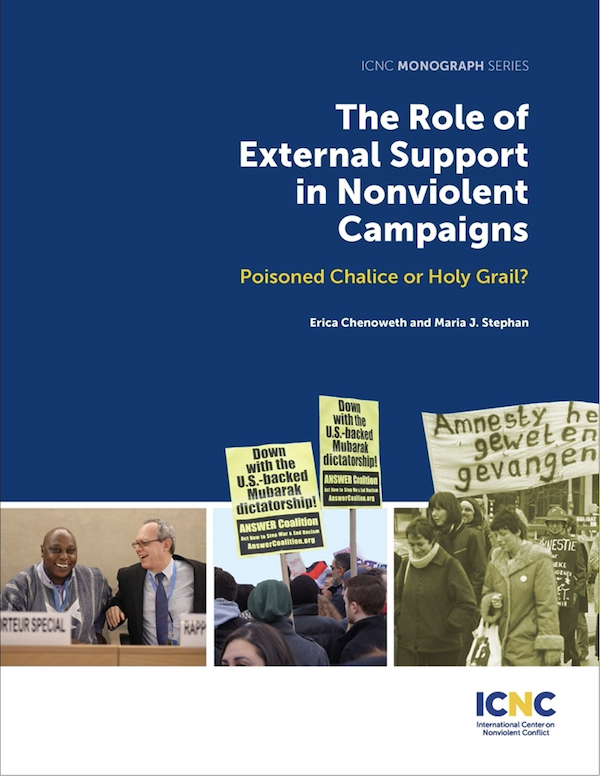Monograph Title:
The Role of External Support in Nonviolent Campaigns: Poisoned Chalice or Holy Grail?
By: Erica Chenoweth & Maria J. Stephan
Date of Publication: February 2021
Free Download
Purchase a Copy
Purchase e-book (Nook | Kindle)
 Description:
Description:
This monograph is based on an ICNC-sponsored multi-year research project that examines the effects of different forms of external aid on the outcomes and longer-term impacts of civil resistance campaigns. Very little research has systematically investigated the impacts of external support on the effectiveness of nonviolent resistance. Existing research reaches somewhat contradictory conclusions, with some finding that external support for nonviolent campaigns is harmful, that external support is sometimes helpful, or that external support has little observable effect. This study assesses different types of external assistance—material and non-material—to civil resistance movements offered by state and non-state actors at different stages: pre-, during and post-conflict periods. It further evaluates the impact of the specific type of aid, its timing and provisions by different actors on the overall trajectories of civil resistance campaigns and their outcomes.
About the Authors:

credit: Martha Stewart
Dr. Erica Chenoweth is the Berthold Beitz Professor in Human Rights and International Affairs at Harvard Kennedy School and a Susan S. and Kenneth L. Wallach Professor at the Radcliffe Institute for Advanced Studies at Harvard University. Chenoweth is core faculty at Harvard’s Carr Center for Human Rights Policy, where they direct the Nonviolent Action Lab. They study political violence and its alternatives, and Foreign Policy magazine ranked them among the Top 100 Global Thinkers of 2013 for their efforts to promote the empirical study of nonviolent resistance. Chenoweth’s most recent book, Civil Resistance: What Everyone Needs to Know (Oxford, 2021), explores what civil resistance is, how it works, why it sometimes fails, how violence and repression affect it, and the long-term impacts of such resistance. Their next book with Zoe Marks, Rebel XX: Women on the Frontlines of Revolution, explores the impact of women’s participation on the outcomes of mass movements and the quality of egalitarian democracy more generally. Chenoweth’s book with Maria J. Stephan, Why Civil Resistance Works (Columbia, 2011), won the 2013 Grawemeyer Award for Ideas Improving World Order and the 2012 Woodrow Wilson Foundation Award, the American Political Science Association’s best book award. Chenoweth’s other books include Civil Action and the Dynamics of Violence (Oxford, 2019), with Deborah Avant, Marie E. Berry, Rachel A. Epstein, Cullen Hendrix, Oliver Kaplan, and Timothy Sisk; The Oxford Handbook of Terrorism (Oxford, 2019) with Richard English, Andreas Gofas, and Stathis N. Kalyvas; The Politics of Terror (Oxford, 2018) with Pauline Moore; Rethinking Violence: States and Non-State Actors in Conflict (MIT, 2010) with Adria Lawrence; and Political Violence (Sage, 2013). Chenoweth’s research has been featured in The New York Times, The Washington Post, Foreign Affairs, The Economist, The Boston Globe, Foreign Policy, The Christian Science Monitor, NPR’s Morning Edition, TEDxBoulder, and elsewhere. They co-host the award-winning blog Political Violence @ a Glance, host the blog Rational Insurgent, and blog occasionally at The Monkey Cage. Along with Jeremy Pressman, they co-direct the Crowd Counting Consortium, a public interest project that documents political mobilization since Donald Trump’s inauguration. Before coming to Harvard, Chenoweth taught at the University of Denver and Wesleyan University. They hold a Ph.D. and an M.A. in political science from the University of Colorado and a B.A. in political science and German from the University of Dayton.

Dr. Maria J. Stephan‘s career has bridged the academic, policy, and non-profit sectors, with a focus on the role of civil resistance and nonviolent movements in advancing human rights, democratic freedoms, and sustainable peace in the US and globally. She most recently directed the Program on Nonviolent Action at the U.S. Institute of Peace, overseeing cutting-edge research and programming focused on the nexus of nonviolent action and peacebuilding. Stephan is the co-author (with Erica Chenoweth) of Why Civil Resistance Works: The Strategic Logic of Nonviolent Conflict (Columbia University Press, 2011). She is the co-author of Bolstering Democracy: Lessons Learned and the Path Forward (Atlantic Council, 2018); the co-editor of Is Authoritarianism Staging a Comeback? (Atlantic Council, 2015); and the editor of Civilian Jihad: Nonviolent Struggle, Democratization and Governance in the Middle East (Palgrave, 2009). From 2009-14, Stephan was lead foreign affairs officer in the U.S. State Department, serving in Afghanistan and Turkey. She later co-directed the Future of Authoritarianism initiative at the Atlantic Council. Stephan has taught at Georgetown University and American University. She received her BA from Boston College and her MA and PhD from the Fletcher School of Law and Diplomacy. Stephan, a native Vermonter, is a lifetime member of the Council on Foreign Relations.